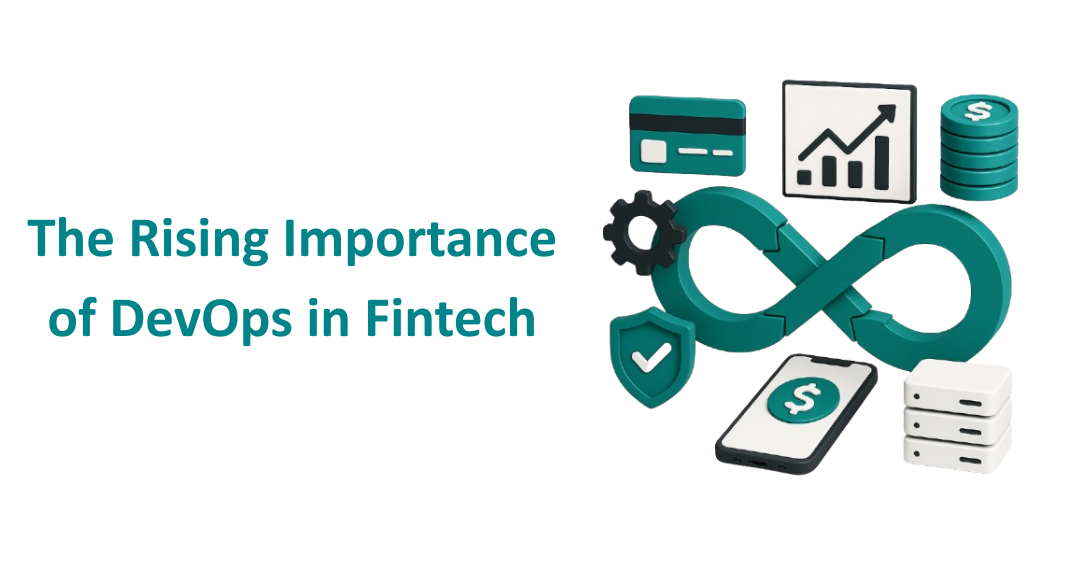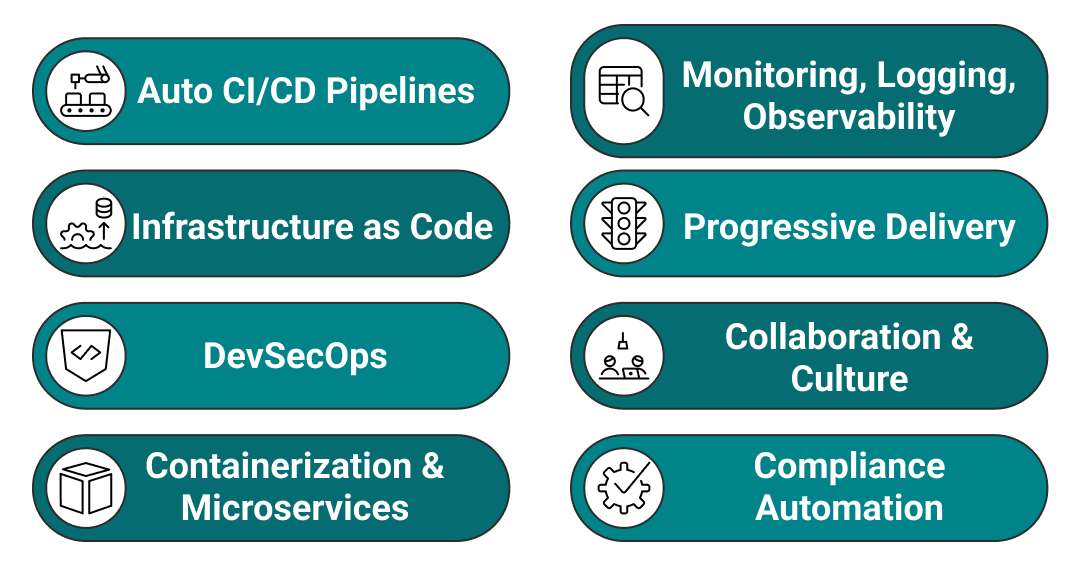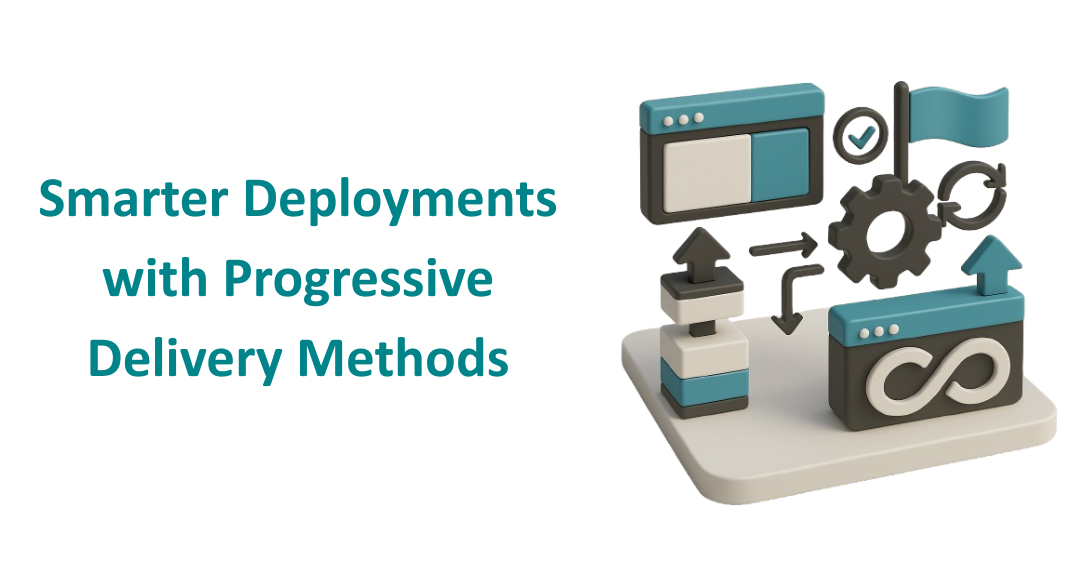
Why DevOps and Cloud Security Matter for Fintech Automation
Fintech companies are under immense pressure to innovate, adapt, and achieve rapid deployment of features and updates in order to stay competitive in a digital-first economy. While regulatory bodies are demanding tight compliance and data security, customers have expectations that we provide real-time services with ease and minimal friction, pushing the need for smarter fintech automation in delivery and support systems. Fintech companies need to be consistently fast and accurate with features and updates, and reassure customers of reliable services at the same time. This is where fintech DevOps strategies provide a competitive edge through automation, collaboration, and rapid feedback loops. A successful fintech DevOps implementation enables this agility by aligning engineering, operations, and compliance efforts from the start, forming the foundation of effective DevOps for fintech organizations.
Where fintech DevOps comes in – it allows fast, secure, and reliable deployments by creating new ways of working between development and operations teams, automating pipelines, and integrating security throughout the software lifecycle. But DevOps alone isn't going to guarantee success for fintech companies - technology is only one part of the puzzle; they also need best practices of their sector that balance innovation with regulation, including robust fintech cloud security, cloud infrastructure security, and flexible microservices architecture for modular development, and FinOps strategies that ensure cost-effective cloud operations all supported by effective DevOps implementation in the fintech environment.
To help fintech companies deploy confidently and quickly, we will now review top DevOps practices. These practices form the foundation of a successful DevOps implementation strategy for fintech organizations and illustrate the growing importance of DevOps in financial services overall.
Why DevOps Implementation Is Essential for Fintech Growth and Security
Fintech applications handle sensitive transactions, user data, and often integrate with banks, payment systems, and third-party APIs, making DevOps in financial services a critical enabler of speed, security, and reliability. They must deliver:
- High availability – financial services can’t afford downtime
- Robust security – to protect personal and financial data
- Scalable infrastructure – to support growth and peak traffic
- Rapid feature releases – to stay competitive and relevant
Traditional development approaches simply don’t cut it. DevOps offers:
- Faster development cycles
- Higher deployment frequency
- Improved system stability
- Reduced time to recovery
DevOps Best Practices for Fintech Rapid Deployment Success
1. Auto CI/CD Pipelines: Speed and Consistency
The foundation of any modern DevOps practice is CI/CD (Continuous integration/Continuous deployment), and it plays a central role in fintech automation for speeding up testing, validation, and release cycles. CI/CD addresses the clear need for all code changes to be safely, reliably, and traceably tested, integrated, and deployed for fintechs.
Best Practices:
- Integrate early and often: Make incremental, frequent code changes, rather than trying to do this later and integrate them all at once.
- Utilize pipeline automation tools: Utilize tools that already exist, and utilize the tools provided by vendors: Jenkins, GitHub Actions, Gitlab CI/CD, CircleCI.
- Use quality gates: Use quality gates such as unit tests, integration tests, and security checks to pass at every stage.
- Use environment promotion strategies: Pass builds from dev → staging, → production using approval gates and canary releases.
Benefits:
- Eliminates bottlenecks
- Improves release velocity
- Reduces deployment errors
2. Infrastructure as Code (IaC): Building Repeatable, Scalable Environments
Fintech platforms often operate across multiple environments (dev, test, staging, production). Manual provisioning leads to inconsistencies, downtime, and non-compliance.
IaC Tools:
- Terraform
- AWS CloudFormation
- Ansible
- Pulumi
Best Practices:
- In version-controlled repositories, define the infrastructure.
- Provide servers, networks, databases, and security policies automatically.
- For improved reusability, use modular IaC.
- Review the code for any changes to the infrastructure.
Benefits:
- Reduces configuration drift
- Enhances auditability
- Speeds up disaster recovery
3. DevSecOps: Embedding Security Across the Pipeline
Security is vital in fintech. Even minor breaches can result in regulatory woes and reputational damage. DevSecOps emphasizes security in the development lifecycle from day one, and it plays a major role in enhancing fintech cloud security across all environments.
Key Security Practices:
- Static code analysis (SAST): Tools like SonarQube, Checkmarx
- Dynamic application security testing (DAST): OWASP ZAP, Burp Suite
- Dependency scanning: Snyk, Whitesource for checking vulnerable packages
- Secrets management: Use tools like HashiCorp Vault, AWS Secrets Manager
Additional Tips:
- Automate compliance checks (PCI-DSS, SOC 2, GDPR)
- Use signed container images and secure base images
- Educate development teams on secure coding
Fintech DevSecOps strategies should also include cloud infrastructure security controls to monitor misconfigurations, prevent data leaks, and ensure a consistent security posture across environments.
Benefits:
- Prevents vulnerabilities early
- Reduces remediation costs
- Simplifies audits and compliance
4. Containerization undefined Microservices Architecture
Fintech operating systems are following the trend of moving towards microservices architecture that are usually deployed in some type of container, and moving away from monolithic operating systems. This shift has increased the adoption of Kubernetes for fintech platforms to orchestrate containerized services reliably at scale. The separation of services from one another allows for unique processes for development, testing, and scaling.
Tools to Use:
- Docker (Container)
- Kubernetes (Orchestration)
- Istio or Linkerd (Service mesh and observability)
Best Practices:
- Package applications in lightweight containers
- Maintain a single responsibility per microservice
- Automate container builds and vulnerability scanning
- Enforce container immutability and versioning
Benefits:
- Faster deployments and rollbacks
- Improved fault isolation
- Easier scalability during peak loads
5. Monitoring, Logging, and Observability: Know What’s Happening
In fintech, issues must be resolved before users are impacted. Real-time observability provides visibility across systems.
Best Practices:
- Implement application and infrastructure monitoring (Datadog, Prometheus, Grafana)
- Collect logs with tools like ELK stack (Elasticsearch, Logstash, Kibana) or Loki
- Use alerting systems integrated with Slack, PagerDuty, or Opsgenie
- Set up SLA and SLO monitoring
What to Track:
- Transaction errors
- API latencies
- Deployment success rates
- Database performance
Benefits:
- Faster MTTR (Mean Time to Resolution)
- Better customer experience
- Data-driven decision-making
6. Progressive Delivery: Blue-Green, Canary, and Feature Flags
Fast doesn’t have to mean risky. Controlled deployment strategies allow fintech teams to roll out features incrementally, especially when combined with a microservices architecture that supports independent service rollouts.
Deployment Strategies:
- Blue-Green Deployment: Maintain two environments, switch traffic after testing.
- Canary Releases: Deploy to a small percentage of users, then scale.
- Feature Flags: Turn features on/off without deploying code.
Tools:
- LaunchDarkly
- Argo Rollouts
- Flagger
- Spinnaker
Benefits:
- Minimized blast radius for failures
- Real-time user feedback
- Safer experimentation
7. Collaboration undefined Culture: Aligning Teams for Success
Although fintech environments move quickly, delays may arise due to silos between the development, operations, and security teams.
Top Techniques:
- Encourage a culture of blameless postmortems so that mistakes can be learned from.
- Make use of Jira, Microsoft Teams, and Slack as collaboration tools.
- Embed operations and security experts within development teams
- Host regular cross-functional reviews
Benefits:
- Faster issue resolution
- Continuous learning
- Higher team morale
8. Compliance Automation and Governance
Fintech firms must meet strict regulatory obligations. Automating compliance ensures consistent controls without slowing down innovation. In addition to governance, these tools support cloud security in fintech, helping teams protect data while ensuring regulatory alignment.
Compliance Tools undefined Techniques:
- Use OPA or Sentinel to manage rules and track changes.
- Keep detailed audit logs of user actions and deployments.
- Control access with IAM and RBAC.
- Scan for compliance with standards like PCI and ISO 27001.
Cloud infrastructure security in finance must also be integrated with compliance checks to align operational safeguards with regulatory requirements.
Benefits:
- Reduced manual compliance effort
- Fewer audit-related surprises
- Peace of mind for stakeholders and partners
Common Pitfalls to Avoid
- Over-reliance on tools without a cultural shift
- Skipping tests to speed up releases
- Neglecting rollback strategies
- Not prioritizing security early enough
- Treating DevOps as a one-time project rather than a continuous process
End Note
In the fintech arena, DevOps in financial services is about more than just speed; it is about innovation, resilience, compliance, and building customer trust. Technologies like Kubernetes for fintech further support this mission by enabling scalable, secure deployments across cloud-native architectures. Fintech companies can create a solid platform for reliable and rapid deployment, satisfying the stringent standards of the financial industry by applying best practices to their processes, a critical part of modern DevOps for fintech teams.
DevOps is a mindset rather than a tool. One that drives the next wave of digital financial services when done right.
How Seaflux Can Help
Seaflux Technologies is a trusted undefineda class="code-link" href="https://www.seaflux.tech/custom-software-development" target="_blank"undefinedcustom software development companyundefined/aundefined and undefineda class="code-link" href="https://www.seaflux.tech/industry/fintech" target="_blank"undefinedfintech solutions providerundefined/aundefined. We help startups and enterprises implement secure, scalable undefineda class="code-link" href="https://www.seaflux.tech/hire-devops" target="_blank"undefinedDevOps servicesundefined/aundefined tailored for financial compliance and speed.
As expert DevOps service providers, we deliver everything from automated CI/CD to cloud security solutions and custom cloud solutions. Our team ensures fast, secure deployments through reliable fintech DevOps strategies.
Looking for a reliable undefineda class="code-link" href="https://www.seaflux.tech/cloud-computing-services" target="_blank"undefinedcloud solutions providerundefined/aundefined or custom fintech solutions to scale your operations?
Let’s talk. undefineda class="code-link" href="https://calendly.com/seaflux/meeting?month=2024-02" target="_blank"undefinedContact usundefined/aundefined today to schedule a consultation.

Dhrumi Pandya
Marketing Executive









